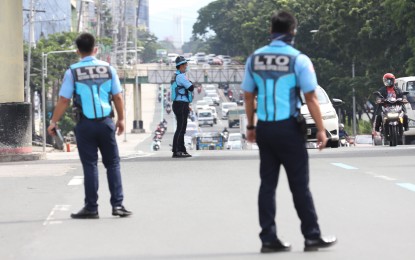
LTO traffic enforcers (PNA photo by Robert Oswald P. Alfiler)
MANILA – The Land Transportation Office (LTO) and the Philippine Coast Guard (PCG) have joined forces in the implementation of the “no registration, no travel” policy against unregistered private and public utility vehicles (PUVs).
In a statement Tuesday, LTO chief, Assistant Secretary Vigor Mendoza II said a meeting with officials of the PCG resulted in the finalization of the strategic plans for the implementation of the policy.
“Malaki pa ang hahabulin namin sa (We still have a long way to go at) LTO but with hard work, strategic planning and implementation, and the dedication to road safety of all our personnel, I am confident that we will finally reach our target,” Mendoza said.
The participation of the PCG, he said, is based on the directive of Transportation Secretary Jaime Bautista.
During the meeting, he said around 30 percent of the daily income of registered PUV operators and drivers is stolen by "colorum" or unregistered PUVs.
“We understand these concerns and this is the reason why we have been strengthening our coordination and interoperability with the PCG and other law enforcement agencies against these colorum vehicles,” he said.
From Jan. 1 to 23, 182,458 motor vehicles across the country have been apprehended as part of the joint government effort on the “no registration, no travel” policy.
Of the total, 48,714 are four-wheeled vehicles while 133,744 are motorcycles.
During the same period, a total of 1,966 vehicles have been impounded -- 1,735 motorcycles and 231 four-wheeled vehicles.
“I am personally monitoring both our law enforcement operations and the information drive and I commend our officials and personnel for this positive result. The figures are encouraging and I am confident that more delinquent motor vehicles will be registered in the coming days,” he said.
He commended the LTO-National Capital Region (NCR) for having the highest number of registrations of delinquent motor vehicles with 32,370, followed by LTO-Region 7 with 22,729; LTO-Region 3 with 22,133; and LTO-Region 4-A with 18,428.
The strict implementation of the policy, he said, is necessary to compel the remaining delinquent motor vehicles to comply with the annual vehicle registration requirement of the LTO.
“Let me inform them na pinapalawak na namin ang aming mga (that we are expanding our) impounding areas specifically for this purpose,” he said.
Based on LTO data, around 24 million motor vehicles nationwide have expired registrations and are made up mostly of motorcycles.
As part of the annual registration process, motor vehicles are checked for their roadworthiness.
These 24 million unregistered and unchecked motor vehicles make up 60 percent of the total number of vehicles in the country. (PNA)
